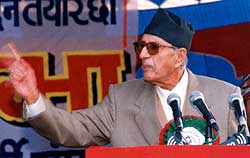 A disturbing feature of our national malaise is the prominence animosity has acquired as the operating emotion. It's not the rage of Girija Prasad Koirala or Madhav Kumar Nepal that we should be worried about. They're the aggrieved party, after all, and are entitled to fits of fury. The new power elite can't quit blaming the multiparty leadership for creating today's mess. We know our leaders were lousy. That's why they're out of power and not too many of us are out on the streets yet.
A disturbing feature of our national malaise is the prominence animosity has acquired as the operating emotion. It's not the rage of Girija Prasad Koirala or Madhav Kumar Nepal that we should be worried about. They're the aggrieved party, after all, and are entitled to fits of fury. The new power elite can't quit blaming the multiparty leadership for creating today's mess. We know our leaders were lousy. That's why they're out of power and not too many of us are out on the streets yet. 
For a political group free of electoral compulsions, the temptation for candour becomes all the more irrepressible. Ministers shouldn't insult our intelligence by mouthing platitudes. Not that moments of healthy honesty are entirely lacking. One minister asserted that the Maoist assaults on Jumla were an expression of their impatience for talks. Another shed some personal light on how Nepal was on its way towards the restoration of democracy before the royal succession of January 1972. The doctor who said this constitution wasn't worth the paper it's printed on may have been a little irreverent, but you can't say he was untruthful. The dissonance in ministerial discourse isn't that unbearable either. You can't expect an assorted assemblage of enthusiasts to speak in one voice on an issue like the Maoist insurgency which has divided the country for so long. Loud thinking is tolerable, moreover, when the perils of irrational exuberance are painfully apparent. (Remember how Sher Bahadur Deuba announced a truce with the Maoists before finalising his cabinet last year?)
We need more ministers who don't cringe each time some big-party politician says the cabinet doesn't have executive authority. Since the people never put them where they are, we don't expect them to be answerable to us. The fact that the only legislator in the cabinet is a palace-nominated member of the upper chamber should help put things in perspective. Say the palace came out with a formal proclamation returning executive authority to the council of ministers. Would that discourage us from turning to Narayanhity every time someone in Singha Durbar bungled?
The definition of politics as strife of interests masquerading as a contest of principles is too universal to be ignored. The people recognise those who refused to join the government and realise why.
The two main political parties have an election to contest and are running out of issues to keep their flock together. Those who considered themselves "untainted" enough to become ministers couldn't undertake not to contest the elections, which augurs well for our politics.
The international outlook is grim. Of the 81 countries that embraced democracy in the 1980s and 1990s, only 47 are considered fully free today. With Cold War-style strategic alliances increasingly defining the post-9/11 international order, democracy and human rights are on the defensive. However, we can live without personal assurances of press freedom from the communications minister as long as we get to read six-column headlines on how the people's rights have been taken away.
Ministers, for their part, needn't be distracted by the dirt some of us in the media dig up from their past. When this is the best bunch of leaders the country could find, you know who the joke's on.
Attitudes must change from the top. The prime minister shouldn't feel ashamed he got to know some of his ministers just before the swearing in ceremony. We were the ones who accused Koirala of packing the cabinet and party central committee with people he knew very well.
This may turn out to be a defining moment for Nepali democracy. As we questioned the moral and intellectual competence of the professional politicians we saw since 1990, didn't we wonder whether people with superior knowledge and virtue could be entrusted with the public good? From the way disgruntled and disgraced former members of the big parties have joined hands with emblems of partyless administrative ruthlessness, this cabinet does set off alarm bells. Deeper down, though, lurks an opportunity to complete the unfinished business of Kathmandu Spring.
Doctors, engineers, activists and business people long complained how they were the real drivers of the People's Movement. A lot of them are ministers today because leading Kangresis and comrades were too furious to serve. This fact shouldn't stop our experts and entrepreneurs from picking up from April 1990. Just try not to build a reputation on what you hope to accomplish.


